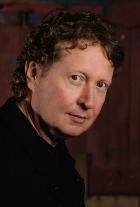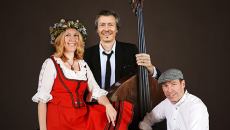18th Annual Swiss Learning Festival
LIFE WORK
Data
Prof. Dr. Ruth Lanius (CAN)
Dr. Peter A. Levine (USA)
Prof. Dr. Stephen Porges (USA)
Seestrasse 53 - 55
6353 Weggis
If you have questions about the Festival, please write to infotE4uBjeBoXGEvJppolarity.ch
We are happy to help you.
Prof. Dr. Sue Carter,
Prof. Dr. Ruth Lanius,
Dr. Peter A. Levine,
Prof. Stephen Porges
Thursday, August 15, 2024
10.30
Opening with Dr. Urs Honauer (CH)
Host and initiator of the Bildungsfestival
10.45 am - 1 pm and 3 pm - 6.15 pm
Bridging Polyvagal Theory and Clinical Applications: A Personal Journey
Prof. Dr. Stephen Porges (USA)
Heart rate variability (HRV) has been a focal point throughout my academic history. To put into perspective, I have published studies spanning seven decades focusing on HRV (1969–2022). My interest in HRV started early in graduate school and continues to be an important portal informing my theoretical perspective. This history started as an empirical observation and moved through several scientific stages including development of quantitative methods and investigations of neural mechanisms. Along this journey a variety of hypotheses were tested including the relative sensitivity of HRV metrics to neural mechanisms, psychological processes, and medical diagnoses. In addition, the research led to the identification of portal of intervention that have become strategies to optimize mental and physical health. These apparent disparate programs of inquiry have been tightly merged as the Polyvagal Theory evolved. This talk will describe my personal journey through these stages of scientific inquiry and my attempts to integrate this new knowledge into an expansive theoretical model and use this model to inform healthcare, education, and our understanding of human behavior in our challenging world.
8 pm - 9.30 pm
Polyvagal music
Anthony Gory (GB) and Prof. Dr. Stephen Porges (USA)
About a year ago, two distinct worlds converged, as Anthony Gorry and Dr Stephen W Porges embarked on a transformative journey. The ground breaking creation of their collaboration, Polyvagal Music and the “Rest and Restore Protocol”, stemmed from their achievements in totally different domains – science and music. Fuelled by a shared passion to lessen the burden of chronic disorders, they embarked on a challenging journey to create a new technology and form of music to enhance health and well-being. Their commitment to this goal required them to blend their skills and insights to create a biologically informed music, composed to signal the autonomic nervous system to promote the homeostatic processes of health, growth, and restoration. The creative magic of the “Rest and Restore Protocol” lies in the harmony of their passion, drive, and natural curiosity, which has enabled them to blend their creative resources into a unique partnership.
 Anthony Gorry
is a music producer, audio designer and composer; he has a Bachelor of
Arts in Music and Performing Arts and a diverse portfolio which includes
co-producing music for nature documentaries, collaborating with BAFTA
award-winning production teams, and working with renowned artists and
Grammy award winning producers, including Gwen Stefani, No Doubt,
Richard Ashcroft and Moby, having had success at the top of the U.S and
International charts. Anthony
has worked with many international brands, including L'Oréal and Adidas
producing content for worldwide campaigns and has had his work featured
in movies and television. Recently he served as an audio consultant for
LG’s emerging technology team in Silicon Valley.
Anthony Gorry
is a music producer, audio designer and composer; he has a Bachelor of
Arts in Music and Performing Arts and a diverse portfolio which includes
co-producing music for nature documentaries, collaborating with BAFTA
award-winning production teams, and working with renowned artists and
Grammy award winning producers, including Gwen Stefani, No Doubt,
Richard Ashcroft and Moby, having had success at the top of the U.S and
International charts. Anthony
has worked with many international brands, including L'Oréal and Adidas
producing content for worldwide campaigns and has had his work featured
in movies and television. Recently he served as an audio consultant for
LG’s emerging technology team in Silicon Valley.8.00 am - 9.00 am
Trauma-Sensitive Qi Gong
Paki E. Heisserer (CH)
10 am - 1 pm and 3 pm - 6.15 pm
Dissociation, Altered States and Embodied Change
Prof. Dr. Ruth Lanius (CAN)
This contribution will explore how individuals coping with trauma often resort to dissociation across five dimensions of consciousness: time, thought, body, emotion, and intersubjectivity. The persistent experience of dissociation and altered states of consciousness in the aftermath of trauma can lead to self-fragmentation, disembodiment, reliving flashbacks, voice hearing, dysregulated arousal, and a diminished capacity to feel alive. Addressing these foundational challenges is essential to helping individuals transform into embodied, active agents capable of connecting with others through curiosity, coregulation, language, and play.
Historically, trauma-related symptomatology has been predominantly viewed as a manifestation of disrupted higher-order cognitive processes. However, a recent shift in perspective calls for a deeper understanding of post-traumatic stress dysfunction within the central nervous system as a breakdown in sensory integration. This shift directs attention towards brainstem and midbrain processes and their subsequent integration with the higher reaches of the cortex.
How can we employ neuroscientifically-informed interventions to guide traumatized individuals in their journey towards becoming embodied, active agents, facilitating connections with others through finding solid ground? The Professor from Canada will present her insights and solutions – and focus on these specific areas:
- An integrative treatment approach—drawing from a range of modalities, including CBT, DBT, Deep Brain Reorienting, sensorimotor therapy, Somatic Experiencing, SMART, EMDR, and IFS—to help clients feel “whole” and experience fulfilling relationships with their self and others
- Bottom-up treatment approaches that target manipulation of sensory, vestibular and motor experience to facilitate grounding and bring emotion regulation, connection, and coregulation online
- How understanding brain networks critical to the experience of the five dimensions of consciousness can guide our clinical practice
Yodeling Crash Course by the Lake
Sonja Morgenegg and Guillaume André
"Just imagine: You're standing on the mountain and you can just yodel away!"Sonja Morgenegg and Guillaume André focus on precisely this expression of inner joy and everyones very own approach to the yodeling voice on this taster evening.
Anyone who wants to can get to know the Swiss yodeling technique and make their first attempts at yodeling. Sonja Morgenegg knows how to lure people out of their shells in a humorous way and to tease out the first yodeling sounds with playful ease. Together, the participants will also learn a simple, traditional Swiss natural yodel (text-free yodel) and gain self-confidence by listening carefully and using a gentle yodel accompaniment.
The evening is intended to be a fresh and cheerful yodeling taster course - a joy to listen to! Participation is of course voluntary, it is also possible to simply join in the circle and enjoy the sound bath.
8.00 am - 9.00 am
Trauma-Sensitive Qi Gong
Paki E. Heisserer (CH)
10 am - 1 pm and 3 pm - 6.15 pm
Life Work
Dr. Peter A. Levine (USA)
8 pm - 9.30 pm
"Wild Yodel" concert with the Sonja Morgenegg Trio
at the pavilion by the lake
(near the boat landing in Weggis)

The Thurgau singer Sonja Morgenegg proves just how varied, colorful and
surprising yodeling can be ... Her concert program takes a broad view of
yodeling, and the charismatic singer uses her warm, round voice just as
broadly - diverse and free, sensual, exultant, meditative or archaic.
This is how she was once described in a newspaper article. The
creative folk music is sometimes finely dosed with a monochord or
underpinned by a masterfully played double bass - or by the rustic
instruments didgeridoo, accordion or jew's harp. The old and new folk
songs appear cheeky in the new guise of polyphonic songs, accompanied by
the banjoele - a mixture of ukulele and banjo - and the cajon. The
in-house alpine blessing sounds echo-like, spherical live with loops.
The term "Wild yodel" was chosen deliberately. It is not filled with
images and listener expectations - it is a liberating term and expresses
the biodiversity of the yodeling world in the image of the wild flower
meadow. "Free, unbound and yet rooted!" The "wild yodel" genre is
characterized by cheeky folk music and archaic world yodeling through to
spherical soundscapes.
The Sonja Morgenegg Trio is made up of
Sonja Morgenegg (yodel, vocals, guitar, ukulele, dulcimer, loops)
Guillaume André (yodel, vocals, percussions, didgeridoo) and
Rätus Flisch (double bass, loops)
8.00 am - 9.00 am
Trauma-Sensitive Qi Gong
Paki E. Heisserer (CH)
The Healing Power of Love:
An Oxytocin-Hypothesis
Prof. Dr. Sue Carter
Oxytocin is a peptide molecule with a multitude
of physiological and behavioral functions. Based on its association with
reproduction, including social bonding, sexual behavior, birth and maternal behavior,
oxytocin also has been called “the love hormone.” This presentation will examine parallels
between the healing power of oxytocin and love. As described here, many myths and gaps in knowledge remain
concerning oxytocin and love. A few of these are described and we hypothesize
that the potential benefits of both love and oxytocin may be better understood
in light of interactions with more ancient systems, including the autonomic
nervous system, vasopressin and the immune system. Oxytocin is anti-inflammatory
and is associated with comparatively recently evolved, social solutions to a
variety of challenges necessary for mammalian survival and reproduction. The shared functions of oxytocin, the
vagus nerve and love have profound implications for health and longevity,
including the prevention and treatment of excess inflammation and related disorders,
especially those occurring in early life and during periods of chronic threat
or disease.
2 pm - 3.30 pm
Panel and open space
with Sue Carter, Ruth Lanius, Peter A. Levine, Stephen Porges
Facilitator: Dr. Urs Honauer
Prof. Dr. Sue Carter
Sue Carter, Ph.D. is currently a Professor of Psychology at the University of Virginia and a Distinguished Research Scientist and Rudy Professor Emerita of Biology at Indiana University. She has held Professorships at the University of Illinois at Chicago, the University of Maryland, College Park (where she was a Distinguished University Professor), and the University of Illinois, …
Prof. Dr. Ruth Lanius
Ruth Lanius, MD, Ph.D., Professor of Psychiatry is the director of the posttraumatic stress disorder (PTSD) research unit at the University of Western Ontario. She established the Traumatic Stress Service and the Traumatic Stress Service Workplace Program, services that specialize in the treatment and research of Posttraumatic Stress Disorder (PTSD) and related comorbid disorders. She currently …
Dr. Peter A. Levine
Peter A. Levine, Ph.D. (USA) is the originator and developer of Somatic Experiencing® and the President of the Foundation for Human Enrichment. He holds doctorate degrees in both Medical Biophysics and Psychology. During his forty plus year study of stress and trauma, Dr. Levine has contributed to a variety of scientific, medical, and popular publications. His best selling book, Waking the …
Prof. Dr. Stephen Porges
Professor Stephen W. Porges, PhD is a Distinguished University Scientist at Indiana University, professor of psychiatry at the University of North Carolina and professor emeritus at the University of Illinois at Chicago and the University of Maryland. He has published more than 400 peerâ€reviewed scientific papers that have been cited in more than 50,000 peer-reviewed papers and holds several …
Anmeldung nicht möglich!
Wir haben Sie als Bot (Web-Roboter) identifiziert, bitte verwenden Sie einen anderen Browser oder wenden Sie sich an unseren Kontakt.